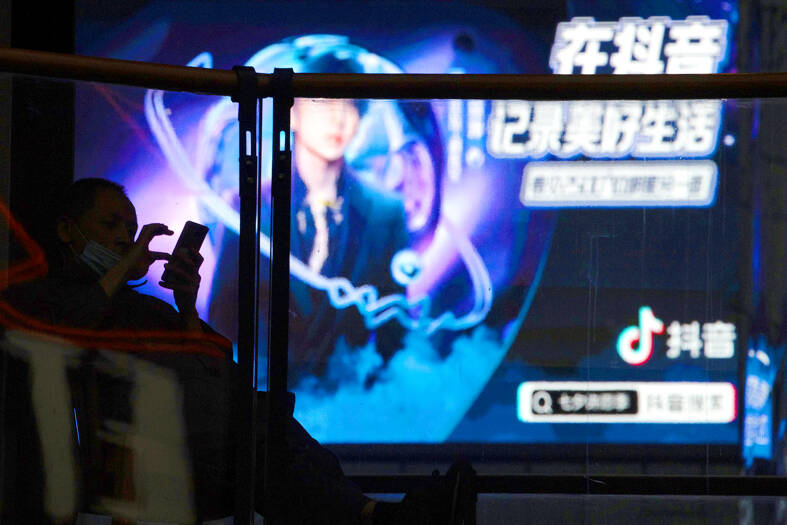Authorities should investigate whether ByteDance Taiwan is affiliated with Beijing-based ByteDance Ltd (字節跳動), which would show whether they are upholding the Act Governing Relations Between the People of the Taiwan Area and the Mainland Area (臺灣地區與大陸地區人民關係條例), the Mainland Affairs Council (MAC) said yesterday.
Article 73 of the act states that China-based social media software companies — which includes TikTok and its Chinese version, Douyin (抖音) — are prohibited from establishing branch offices in Taiwan, the council said on Thursday.
Tiktoktaiwan Co Ltd (昇洋國際生技), registered in 2019, on Nov. 2 changed its registered name to ByteDance Taiwan (字節跳動台灣), Ministry of Economic Affairs’ records show.

Photo: AP
The government’s lack of action contradicts its verbal commitment to reduce the influence of Chinese technology firms in Taiwan, Democratic Progressive Party (DPP) Legislator Chiu Chi-wei (邱志偉) said.
Chiu cited the example of an investigation into China-based streaming media service iQiyi (愛奇藝) that took two years before the Taiwanese representative terminated the contract.
TikTok poses a greater information and national security risk than iQiyi, Chiu said, pushing for an urgent government probe.
Taiwan Thinktank member Tung Li-wen (董立文) said the government should not allow software that poses a “great risk” to Taiwan, and phase out such software throughout Taiwan.
Tung said that enacting new legislation might require a long and complex process, but Taipei can use existing laws, such as the Consumer Protection Act (消費者保護法), or the Criminal Code, to begin controlling what content a platform delivers.
Association of Chinese Elite Leadership Secretary-General Wang Chih-sheng (王智盛) said TikTok’s security risk is well known, citing Indiana Attorney General Todd Rokita’s lawsuit against TikTok for misleading consumers about its age-appropriateness and its protections for shielding US user data from access by the Chinese government.
The US Senate passed a bill on Wednesday banning federal employees from using TikTok on government devices, and Taiwan should implement similar measures, Wang said.
Even if Taiwan cannot duplicate every restriction the US has enacted against TikTok, Taipei should be able to use creative methods to “take the fight head-on” with the company, he said.
Such efforts would provide examples for the international community to follow, he added.
The most pressing issue to investigate is how the company managed to enter Taiwan despite regulations, Wang said.

SECURITY: As China is ‘reshaping’ Hong Kong’s population, Taiwan must raise the eligibility threshold for applications from Hong Kongers, Chiu Chui-cheng said When Hong Kong and Macau citizens apply for residency in Taiwan, it would be under a new category that includes a “national security observation period,” Mainland Affairs Council (MAC) Minister Chiu Chui-cheng (邱垂正) said yesterday. President William Lai (賴清德) on March 13 announced 17 strategies to counter China’s aggression toward Taiwan, including incorporating national security considerations into the review process for residency applications from Hong Kong and Macau citizens. The situation in Hong Kong is constantly changing, Chiu said to media yesterday on the sidelines of the Taipei Technology Run hosted by the Taipei Neihu Technology Park Development Association. With

CARROT AND STICK: While unrelenting in its military threats, China attracted nearly 40,000 Taiwanese to over 400 business events last year Nearly 40,000 Taiwanese last year joined industry events in China, such as conferences and trade fairs, supported by the Chinese government, a study showed yesterday, as Beijing ramps up a charm offensive toward Taipei alongside military pressure. China has long taken a carrot-and-stick approach to Taiwan, threatening it with the prospect of military action while reaching out to those it believes are amenable to Beijing’s point of view. Taiwanese security officials are wary of what they see as Beijing’s influence campaigns to sway public opinion after Taipei and Beijing gradually resumed travel links halted by the COVID-19 pandemic, but the scale of

A US Marine Corps regiment equipped with Naval Strike Missiles (NSM) is set to participate in the upcoming Balikatan 25 exercise in the Luzon Strait, marking the system’s first-ever deployment in the Philippines. US and Philippine officials have separately confirmed that the Navy Marine Expeditionary Ship Interdiction System (NMESIS) — the mobile launch platform for the Naval Strike Missile — would take part in the joint exercise. The missiles are being deployed to “a strategic first island chain chokepoint” in the waters between Taiwan proper and the Philippines, US-based Naval News reported. “The Luzon Strait and Bashi Channel represent a critical access

Pope Francis is be laid to rest on Saturday after lying in state for three days in St Peter’s Basilica, where the faithful are expected to flock to pay their respects to history’s first Latin American pontiff. The cardinals met yesterday in the Vatican’s synod hall to chart the next steps before a conclave begins to choose Francis’ successor, as condolences poured in from around the world. According to current norms, the conclave must begin between May 5 and 10. The cardinals set the funeral for Saturday at 10am in St Peter’s Square, to be celebrated by the dean of the College